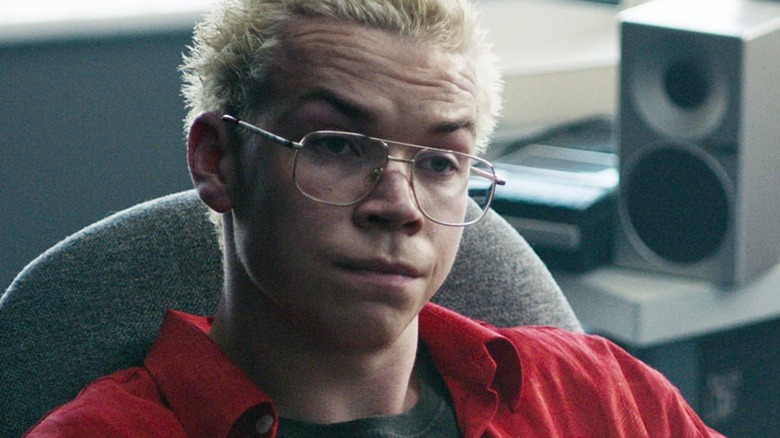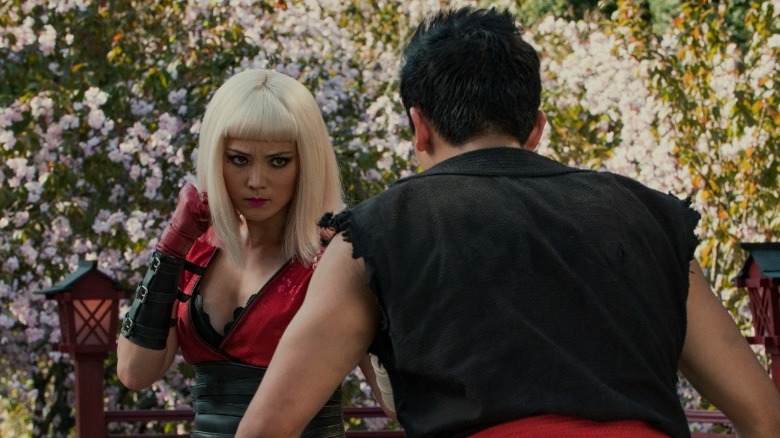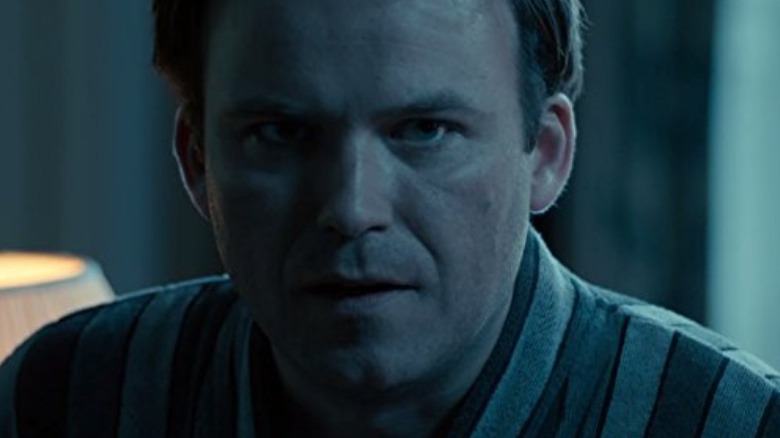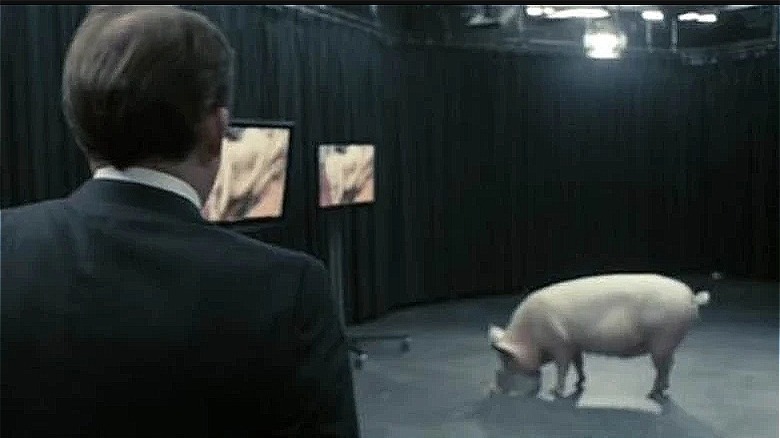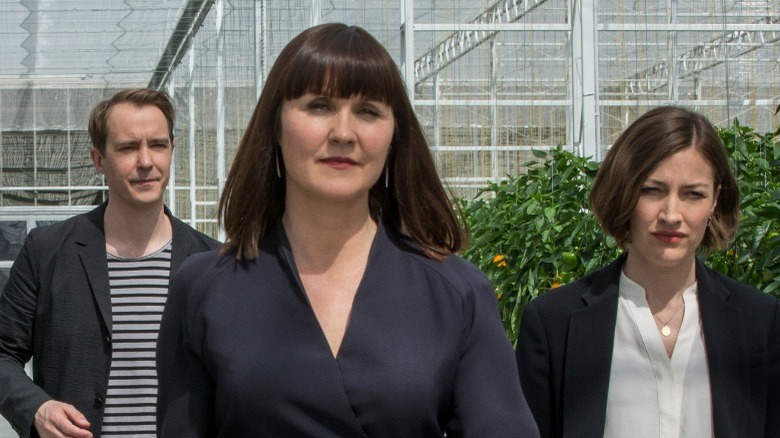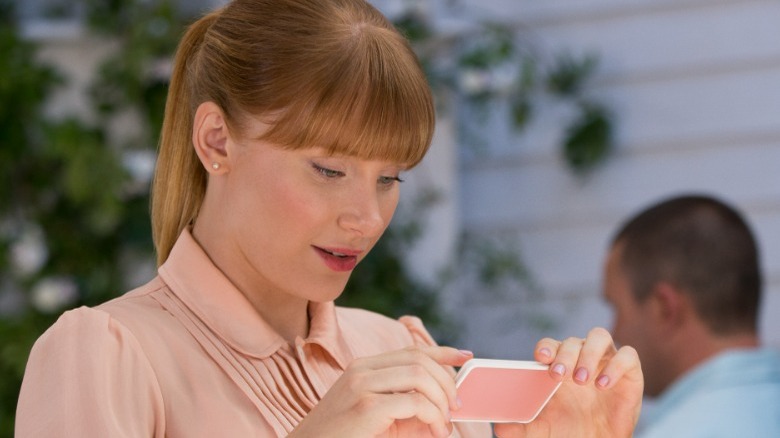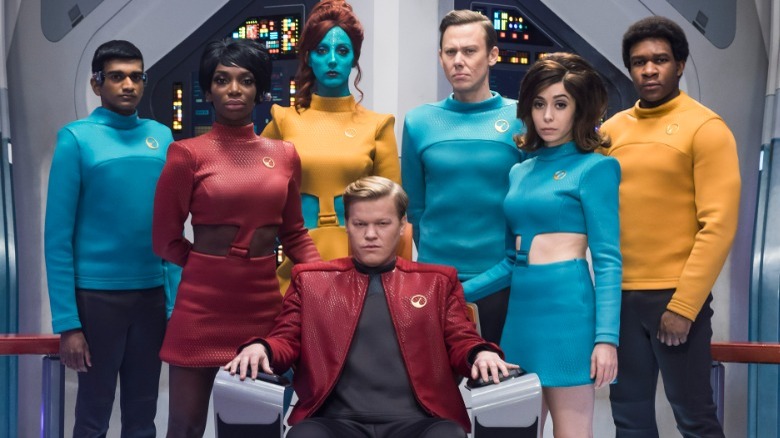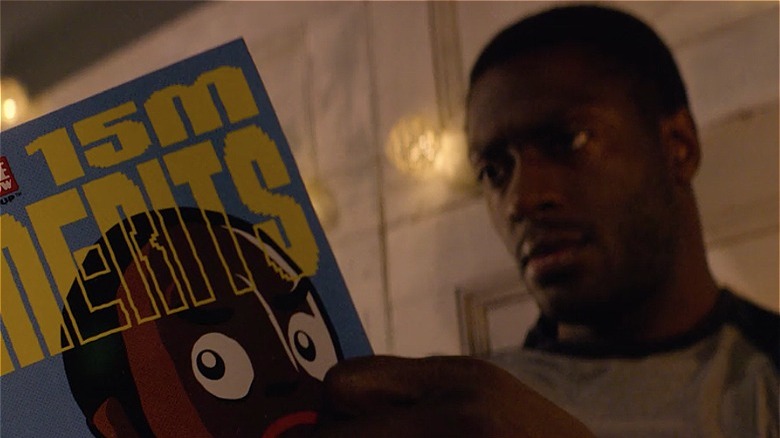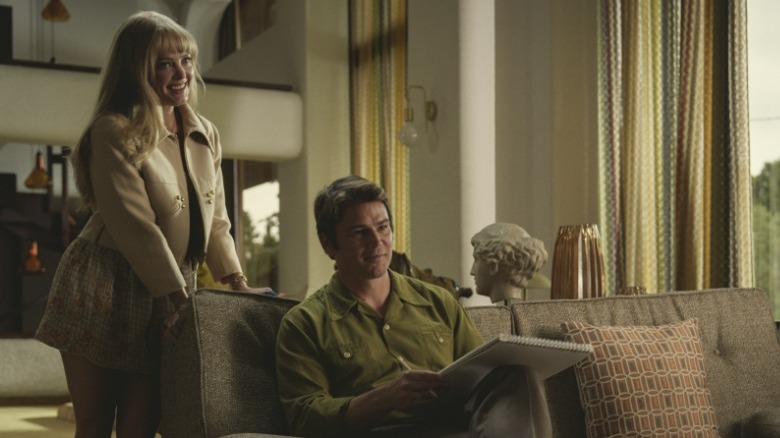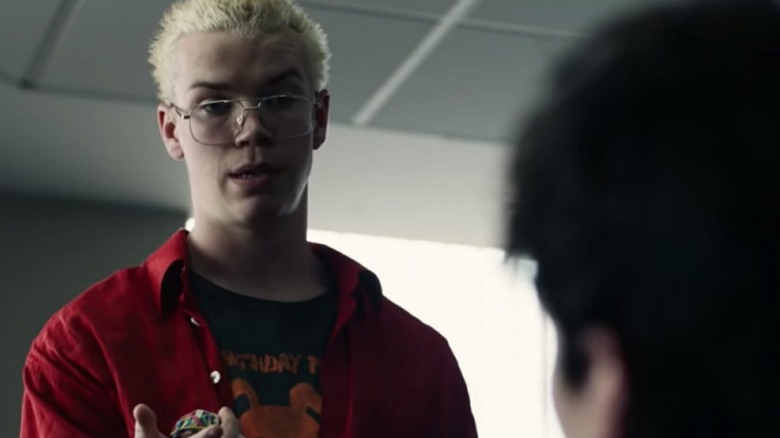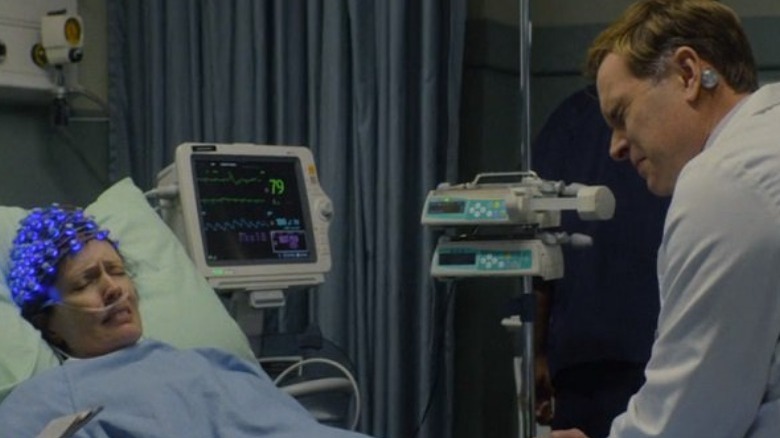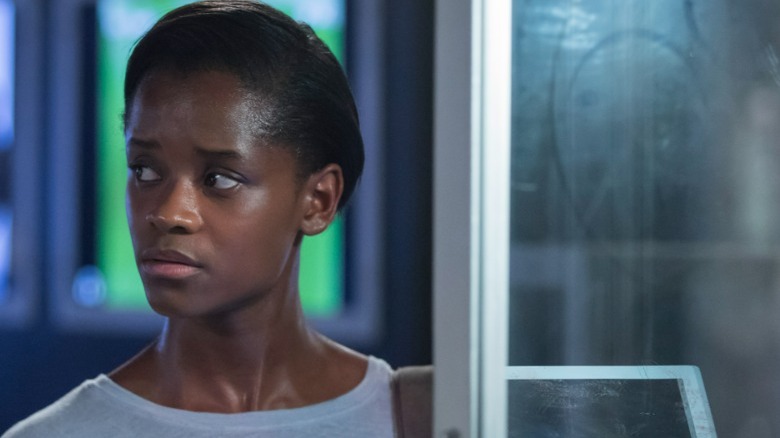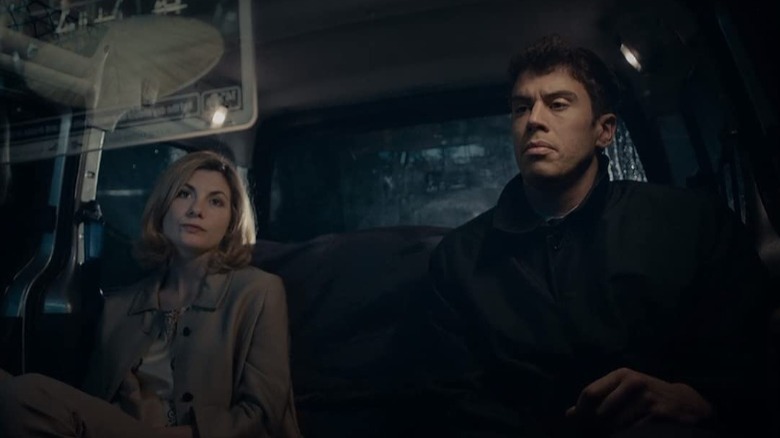The Untold Truth Of Black Mirror
These days, the world we live in is increasingly intertwined with technology. Humans have quickly gone from occasionally relying on basic telecommunications and computer tech to living in a completely connected world. And with these striking advances in innovation, we also find ourselves faced with complex moral and ethical questions pertaining to how that technology intersects with our lives. That morally murky intersection is the primary occupation of Netflix's "Black Mirror," a speculative fiction anthology that sets out to explore the darker side of these tools we've developed to improve our lives.
Over the course of its run, the series has created a fleshed-out version of reality in which to explore those questions. As humanity becomes enmeshed in an AI arms race and rapid advancements in gene editing, the questions posed by "Black Mirror" are as relevant as they've ever been. If you're as big of a fan of show creator Charlie Brooker's dark vision as we are, pop in your Z-Eye as we take a look at the untold truth of "Black Mirror."
It's not meant to be anti-technology.
Each episode of "Black Mirror" focuses on a different technology, presenting the dark side of how human beings and society as a whole interact with technology. Although it's science fiction, many of the technologies presented in the series are not much of a stretch from what's in existence or development now, giving the show an uncanny quality that helps drive home its warnings about our engagement with science and tech. That's because they're inspired by real world technologies like the Boston Dynamics BigDog robot that inspired the military robot dog apocalypse of "Metalhead" or the pet and child tracking technologies that influenced the extreme parental controls of "Arkangel." When contrasted with the optimistic applications of tech presented in "Star Trek," "Black Mirror" seems to present a downright grim view of technology.
But according to creator Charlie Brooker, the series isn't a warning against technology but against human nature's potential to misuse it. In an interview with Rotten Tomatoes, Brooker emphasized, "I love games and technology and all of that stuff. I'm an early adopter of everything." In the world of "Black Mirror" as in real life, technology is merely a tool. According to Brooker, technology merely serves as a vehicle for flawed individuals to inflict harm on others and themselves. "Do we overshare? Do we not have any sense of privacy anymore? We're the perpetrator."
Piggate was real.
Arguably one of the show's most disturbing stories, "National Anthem" places fictional British prime minister Michael Callow (Rory Kinnear) in a difficult position smack dab in the volatile intersection of social media, 24-hour news, and politics. When a British princess is abducted, the kidnapper has a twisted demand: that the P.M. should have sex with a pig on live television. The ensuing struggle explores how information takes on a life of its own in the Digital Age and the toxic impact of this unlimited sharing on political decision making. While the circumstances were quite different, the episode would prove uncannily prescient when it was later revealed that then-P.M. David Cameron was allegedly involved in a scandal rendered in porcine hues.
Dubbed "Piggate," the accusation was revealed in "Call Me Dave," an unauthorized biography penned by Lord Michael Ashcroft and Isabel Oakeshott in 2015. According to the authors, Cameron performed the boarish act with a dead pig while undergoing initiation into the Piers Gaveston Society, a social club with a reputation for hedonism and debauchery. As part of his hazing process, Cameron is said to have put his ham in the bacon despite his denials to the contrary. As in "Black Mirror," the story blew up on social media and in the news. It played out so close to his own dystopian vision that Brooker later told The Guardian, "I did genuinely for a moment wonder if reality was a simulation, whether it exists only to trick me."
Piggate was almost Cheesegate.
Part of the reason that Charlie Brooker was so stunned when he realized he may have accidentally dreamed #piggate into existence may have stemmed from the fact that he almost didn't go with a pig at all. For the pig-powered plot, Brooker told The Guardian he drew inspiration from "The Fabulous Furry Freak Brothers," an underground comic that ran from the late 1960s through the 1990s, and a hot-mic scandal involving Gordon Brown, the prime minister prior to David Cameron.
As reported in The Guardian, Brooker considered other barnyard options before landing on the "Black Mirror" Babe. "We thought all through the farmyard," he explained. "At one point we were thinking of a giant wheel of cheese." But ultimately, the "Black Mirror" team found the idea of a prime minister making it with a hunk of cheese a bit milquetoast and shelved it for the protein-packed alternative. According to Brooker, "You needed something that straddles the line between the comic and horrifying."
As "Black Mirror" commissioner Shane Allen recounted in the book "Inside Black Mirror," other farmyard friends spitballed at the writers' table included a donkey, a horse, a chicken, and a duck. Donkeys and horses were deemed "too cinematically cumbersome," and the feathery fowl were "too small and absurd." Pigs, it seemed, fall into the Goldilocks zone, and the rest is "Black Mirror" history.
Hated in the Nation was based on Charlie Brooker's real experiences.
In our modern climate, it's all too easy to repost a hot take or spout off an angry tweet. But it's also easier than most of us realize to end up on the wrong end of an angry internet mob, something Charlie Brooker learned firsthand in 2004 when he found himself in the digital hot seat. Fortunately for fans of dystopian sci-fi, Brooker managed to draw inspiration from the experience, eventually penning the buzz-generating episode "Hated in the Nation."
Partly inspired by Jon Ronson's book "So You've Been Publicly Shamed," which traces the history of public shaming through to its internet-era renaissance, the Nordic noir-framed "Hated in the Nation" explores the ethics of internet trolls getting their comeuppance. In the episode, whoever gets the most mentions with the hashtag #DeathTo each day ends up killed by hacked autonomous drone insects (ADI). The theme underlines the sense of removal from real-world impact or harm that many feel when anonymously trolling or piling onto a social media mob, something Brooker knows about all too well.
Brooker's own run-in with internet hate came when he was writing a TV column for The Guardian. Reviewing a 2004 presidential debate between John Kerry and George W. Bush, Brooker had lamented, "Lee Harvey Oswald, John Hinckley Jr. — where are you now that we need you?" His commentary met such backlash that the publication pulled it and apologized, with Brooker later writing in The Guardian, "My inbox overflowed with blood-curdling death threats."
Nosedive is actually happening in China.
A merciless rebuke of the like-fueled social media attention feedback loop that keeps influencers vying for subs and crushes teenage self-esteem, the Bryce Dallas Howard-starring episode "Nosedive" kicked off the third season of "Black Mirror" with a message that hit many viewers where they lived. Rendered in ice cream pastels, the episode feels almost cheery compared to the show's typical dystopian fare. But in between the dreamy Instagram-filtered scenes, a frightening picture begins to emerge of a world where everyone's online standing has very real consequences for their ability to work or secure housing.
While an argument could be made that this is already happening to some degree, the People's Republic of China actually uses a social points rating system not unlike the one seen in "Nosedive." According to a government document outlining the plan for the system, social ranking is considered essential to the country's economic structure. Formally rolled out in 2014, the social ranking system has thus far been rather low-tech, kept in motion by information-gathering snoops rather than algorithms. But according to the MIT Technology Review, plans are currently underway to further unify and formalize the system, which the Review says could impact citizens' ability to travel or send their kids to certain schools.
The tone is partially lost on U.S. audiences
As anyone who has seen both the American and British versions of shows like "Ghosts" or "The Office" will know, comedy across the pond tends to be a tad more subtle than humor stateside. Dry, sardonic humor is a second language to many Brits, and for many American viewers, some things just get lost in translation. According to Charlie Brooker, these cultural differences can mean how audiences perceive "Black Mirror" is somewhat geographically dependent.
For Brooker, that characteristically dry British humor has always been integral to his writing. Long before he was known to American audiences, the "Black Mirror" creator made a name for himself in the UK writing for British comedy series like "Nathan Barley," "Brass Eye," and "The 11 O'Clock Show." While frequently dark, his sci-fi series is still infused with that sardonic humor he built his brand on. Telling Rotten Tomatoes he often laughs while he's penning "Black Mirror" episodes, Brooker explained, "I think that doesn't often translate in the U.S., so I'm often absolutely howling with laughter when coming up with the ideas for this show which we then play straight."
The producers liked a fan artist so much they hired him.
One of the ways fans engage with their favorite shows is through the creation of art inspired by the stories and characters they've come to love. Although creators sometimes run into trouble navigating U.S. copyright laws, fan-created art for pop culture franchises will always be prevalent as engage with fictional worlds and participate in the ongoing conversation.
It's not often that a show's creators find fan art they love so much they find a way to make it canon, but that's exactly what happened when Charlie Brooker came across the "Black Mirror" art of Brazilian artist and graphic designer Butcher Billy. With his street art and vintage comic book influences, Butcher Billy's work has been going viral for more than a decade. He first gained attention for his Post-Punk/New Wave Super Friends, which imagined the likes of Billy Idol and Robert Smith as vintage comic book heroes. He went on to stir up some controversy with his Legion of Doom for Real-Life Supervillains project featuring real-world figures like Osama Bin Laden, Adolph Hitler, and Charles Manson.
After the artist decided to create a series called Dark Tales From the Black Mirror, Charlie Brooker came across the work and became an instant fan. He loved it so much he commissioned the artist to create a series of comics for use in the Season 4 episodes "U.S.S. Callister" and "Black Museum."
There was almost a Black Mirror book series
When fans can't get enough of a beloved TV or film series, sometimes they're lucky enough to get accompanying books to go with it. "Star Wars" and "Star Trek" have generated hundreds of official novels through the years, and fans of shows like "Buffy the Vampire Slayer," "Xena: Warrior Princess," and "Charmed" can all find canon reads to fill the void left when their series was canceled. "Black Mirror" came close to having its own book series in 2017 when Penguin announced three volumes were set to drop in 2018 and 2019.
The books were meant to be edited by Charlie Brooker and penned by various authors including Catherine Webb, Cory Doctorow, and Sylvain Neuvel. But as the novels began to progress, Brooker and executive producer Annabel Jones found the project much more complicated than initially expected, and they realized they had to scrap it for the indefinite future. Speaking to Digital Spy, Brooker attributed the problem to the complexities of having outside authors write about their "idiosyncratic" series, concluding, "We have all sorts of rules about how the 'Black Mirror' universe works that we're probably not aware of, until someone else is making stuff for it."
Bandersnatch got Will Poulter bullied off Twitter.
In yet another example of a real-world event mirroring "Black Mirror" content, one of the show's stars found himself the target of an angry web mob's ire. The drama arose after the series released its experimental 2018 film "Black Mirror: Bandersnatch," a choose-your-own-adventure story written by Charlie Brooker and directed by David Slade of "Hard Candy" and "30 Days of Night." The mind-bendingly meta story dealt with the subject of free will through a story about a computer programmer designing his own choose-your-own-adventure video game in 1984.
While the episode's innovative approach to storytelling won the creators a pair of Emmys, some fans felt the complex form impacted the quality of its content, with critics like Salon's Keith A. Spencer lamenting it as tediously self-referential and unnecessarily clichéd. Because someone has to ruin everything, some of the show's less insightful fans took to Twitter bullying its stars. For Will Poulter, who appeared as game developer Colin Ritman, the negativity was just too much to stomach. Citing his mental health, Poulter decided it was time to step back from the platform, signing off with a tweet announcing, "This is not the end. Consider it an alternative path."
The show has some surprising writers.
As the creator of "Black Mirror," Charlie Brooker has penned many of the show's episodes. But some of the show's best episodes were written or co-written by guest writers. Konnie Huq, the longest-running presenter for the British kids' show "Blue Peter," co-wrote the Daniel Kaluuya and Jessica Brown Findlay-starring "Fifteen Million Merits." Jesse Armstrong, who created the hit show "Succession," wrote "The Entire History of You."
But many viewers may be surprised to learn "Nosedive" was co-written by Rashida Jones and Michael Shur of "Parks and Recreation." As Jones told AV Club, "Well, we were both giant Black Mirror fans, and I weaseled my way into Charlie [Brooker]'s life." And they're not the only surprising writers behind "Black Mirror." The first story featured in "Black Museum" was based on a short story written by Penn Jillette of "Penn & Teller." The story, titled "The Pain Addict," was inspired by Jillette's 1981 stay in a Spanish hospital. With the language barrier slowing his diagnosis, Jillette imagined a future where physicians could wear a device to experience their patients' pain. He wrote up the story early in his career, intending to publish it in Penn and Teller's first book, but the editor nixed it, deeming it too dark. Fortunately, it was right up Charlie Brooker's alley, and he was more than happy to immortalize it in his Black Museum.
Nish's accent in Black Museum is something of a feat
It's always surprising to learn an actor's real accent is not at all what you'd expect, especially when they're a Brit who has perfectly pulled off an American accent. There's just something impressive about hearing strong, silent Southerner Rick Grimes transform into English gentleman Andrew Lincoln or tough "Yellowjackets" mom Shauna slip into Melanie Lynskey's cheery Kiwi lilt. And it's even more impressive to see actors who manage to effortlessly pull off more than one accent in the same production, as Letitia Wright does in "Black Museum" — especially since one of those accents is meant to be a bad version of her natural speech.
In the episode, the "Black Panther" star plays an American posing as a British tourist, which required speaking as an American pretending to be British before revealing her American accent. For Wright, a Guyanese-British actor who has lived in London since childhood, it was a strange experience. In an Elle interview, Wright explained, "The weirdest thing for myself was believing the lie that I wasn't who I was pretending to be — a British girl — then to have an American accent but really I'm actually from London."
Robert Downey Jr. almost made a movie based on a Black Mirror episode
Starring Toby Kebbell and Jodie Whittaker, the Season 1 "Black Mirror" episode "The Entire History of You" serves up a bleak analysis of relationships in a world where most of our lives are recorded or surveilled. And in a time when every day of our lives is somehow recorded or tracked by the story told through our phone data and social media, it seems increasingly relevant. Perhaps that's one of the reasons Robert Downey Jr. and George Clooney were willing to get into a bidding war over the rights to adapt the episode into a feature film in 2013.
Writer Jesse Armstrong reserved the right to option the episode when he wrote it. After RDJ won the bidding war, the writer had plans to move ahead with the production on a much larger scale than the "Black Mirror" episode, telling The Independent that it would be developed as a "whole new story." The project never moved forward, and in 2018, Armstrong told Yahoo! Movies it was in "development hell" and "not progressing." Despite the lack of progress, the writer is still hopeful that an eventual film is still in the cards, telling The Independent, "Hollywood abhors waste."
